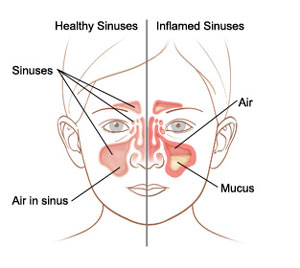A sinus infection, or sinusitis, can make anyone miserable. The sinuses are cavities located in the cheekbones, behind the nasal passages, and in the forehead. Like your nasal passages, your sinuses can become filled with mucus when you are suffering from a cold, allergies, or a virus. Sometimes, bacteria can become trapped in these passages, leading to infection. This infection can cause inflammation and irritation.
You might think that because sinuses in small children are very tiny, and the ones in the forehead do not even develop until the teen years, that your kids are not at risk for developing sinusitis. Unfortunately, this is not true. It simply means that the signs and symptoms will be somewhat different, and diagnosing the infection can be trickier.
Signs Your Child May Have Sinusitis
In most children, sinus infections appear to be very similar to the common cold, which your kids probably experience quite frequently. It is when this cold continues after four or five days that you should begin to worry that an infection might be present. If the cold persists past this point, and the child begins to show signs of a low-grade fever, it could be sinusitis, or it could be another type of infection.
The American Academy of Otolaryngology suggests that, in addition to fever and extended cold-like symptoms, you might also see thick, yellow-green drainage from the nose and swelling around the eyes. Kids who are over the age of six or seven might also experience headaches because of the infection.
What Can Be Done to Treat a Sinus Infection?
 In many cases, if your children are over the age of two, your pediatrician will prescribe antibiotics, and children often respond well to this method of treatment. The symptoms typically start to subside within just a few days. To help your child feel more comfortable, your physician may provide some nasal drops or a spray to help alleviate some of the congestion until the infection is gone.
In many cases, if your children are over the age of two, your pediatrician will prescribe antibiotics, and children often respond well to this method of treatment. The symptoms typically start to subside within just a few days. To help your child feel more comfortable, your physician may provide some nasal drops or a spray to help alleviate some of the congestion until the infection is gone.
If your child continues to suffer from sinus infections, either extremely frequently or the infection does not respond to treatments, this is known as chronic sinusitis. While it is rare, especially in children, it is not unheard of for young kids to suffer from this problem.
In this event, it is especially important to consult with an ear, nose, and throat specialist. This physician will conduct thorough examinations to determine the causes of your child’s ongoing sinusitis. In particular, your doctor will be checking the development of the child’s sinuses, and if there are any structural problems causing blockages.
In some cases, an ear, nose, and throat doctor may suggest surgical options to address chronic sinus problems. This is typically the case if there are blockages that are causing bacteria to become trapped in the sinuses, causing the chronic sinusitis.
Surgery is, of course, not an option that should ever be taken lightly. Before choosing this option, be sure to spend plenty of time consulting with your physician. They can help you to understand the risks, benefits, and expected outcomes for each treatment option.
Preventing Sinus Infections
Sinusitis does often stem from colds. Therefore, the same precautions that you take to prevent the common cold, such as washing your hands regularly, can help reduce the risk of sinus problems. If someone in your household is prone to these infections, it can help to monitor the humidity in the house, and perhaps use a humidifier, to keep the air from becoming very dry. Dry air can irritate the sinuses and increase the risk of infection.
If you have questions or concerns about sinus infection make an appointment to see our ear nose throat specialist.
Sources




